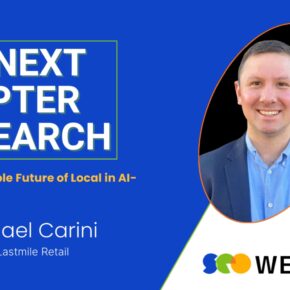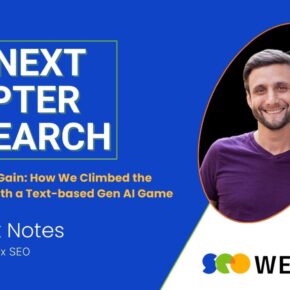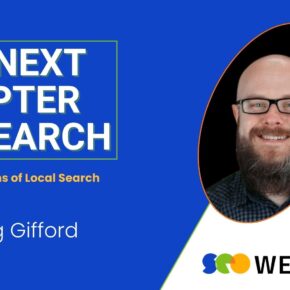
About Lexi Mills
Lexi Mills is a multi-award-winning digital expert specialised in the impact of internet algorythims on emerging technology adoption. She has over fifteen years of experience working at the nexus of internet search and it’s influence on human behaviour establishing her as one of the foremost authorities on building digital trust.
Her research considers the potential and challenges arising from our progressively interconnected world.
Lexi's SEO Week Session
- Title: AI’s Impact on Media and PR SEO
- When to Watch: Day 4 | Thursday, May 1st | 1:45 pm
- Session Abstract: The convergence of AI and big data has redefined publishing, elevating it to a discipline governed by scientific precision. Lexi Mills delves into the transformative influence of AI on the media landscape and, by extension, its implications for PR SEO.
This session offers attendees a forward-looking exploration of emerging trends, advanced tools, and strategic methodologies redefining the future of media and PR SEO. She will cover:
- How these technologies are fundamentally reshaping how and why we need to cultivate backlinks,
- Why PR SEO is critical to trust and conversions
- What a future-proofed integrated PR SEO strategy should look like
Transcript
Garrett: All right, welcome back to The Next Chapter of Search produced by SEO Week and iPullRank. I’m so excited. We are literally under two weeks. Everything’s locked in. I mean, I hope by the time you’re watching this, we don’t, we still have tickets for you to buy because we might not. It’s, this event is packed, and it is April 28th to May 1st, New York City. And I have been talking to all these amazing speakers and literally this is the last one to finish it off. I am joined by none other than Lexi Mills. Lexi is brilliant. She is the CEO at Shift6 and we are going to talk all about the future of digital PR and AI. Lexi, thanks for joining me today. How are you doing?
Lexi: Oh, thanks so much for having me. It’s a pleasure to be here. I’m super excited about this conference. I think we’ve really, really needed a high-level conference that says, “What is the game today?” And across the board, I’ve heard such good feedback about being able to see all the experts who have been there in the past, seen the changes and now looking forward because they have the experience in predicting, right? They’ve predicted and been wrong and they predicted and been right. And I’m super excited to see that.
Garrett: I am fascinated to hear your perspective because you have conversations with globally, like you’re talking to academics, you’re talking to VCs, you’re talking to the leaders of Fortune 500s. Like you hear how people are talking about the direction of search, the direction of PR. From your perspective, the last like 12 to 24 months have been wild. What is the current state of digital PR, of search, of PR traditional in your, like from where you’re coming from, your perspective?
Lexi: So, I think there’s a lot of fear. I think we’ve always feared technology. I’ve done a lot of research into the history of technology and I’ve gone back and found the first adverts, the first commentary letters to editors about mobile phones, which I adore all of that. We’ve always had an aversion to change, which is weird because actually our adaptability has underpinned the survival of our species since the very beginning. And over the last few months, I’ve realized I don’t think this fear is superfounded. I’ve had it. So, I can own that I sat there and panicked, but more and more I’m realizing that this is just more opportunity.
So, what I’m noticing is yes, people are seeing traffic drops and they panicked, which they rightly should. Traffic has always been business, it has always been commerce, it’s always been achieving your goal, whether you’re an NGO or whether you’re selling cat cupcake molds online, right? But what we’re actually seeing is with the drop in traffic, we’re actually seeing a high conversion rate coming out of a lot of the LLMs. They’re giving people more of what they want and they’re converting. So actually, we need to adjust what we were looking at before. We need to change our perspective and stand back and say, what is our original goal? And I think this is what’s really going to segment the future marketeers and communication professionals. Who’s always been focused on the end goal, the real goal, not how many pieces of coverage can you get, but how many pieces of coverage have you got that actually moved the needle? Can you own it? Because it has been the case since the beginning of my career. You go and get a piece in the New York Times, the Telegraph, USA Today, and absolutely nothing happens on the needle. I’ve been watching metrics since as long as I can remember, I always loved them, but the needle doesn’t move. And then you go and put a piece in Plumbers Monthly and the client rings you up and say, what did you do? And they’re not even happy because they can’t handle the inbound phone calls and they feel like they should have been told. You’re like, well, I had no idea at that point that Plumbers Monthly was going to wipe the floor of the New York Times.
But I learned a lot about trade press because I saw that pattern repeatedly in my career. And it took so much work to persuade clients to let us focus on trade. And what realistically has happened because a happy client doesn’t burn time, which means they’re not burning budget, which means they’re not burning potential results. So, you have to go out and get the big hitters whilst you’re secretly working on the stuff that’s going to move the needle. But what I’ve really seen across the board, because I’ve actually audited all my past and all my present clients for LLM optimization, and trade media is kicking ass. That stuff has always been great for links, even though their domain authorities are lower, which again is another example of something we need to reconsider, their relevancy and their trust is high, higher than most of the tools we’ve been watching have actually ever implied. And we’ve seen it in ranking movements in the past, but now we’re seeing an LLM optimization. And so people who have invested in trade are actually going to do better. Also, trade is one of the solid ways to get international. So, if you really want those hero pieces, you should be starting with trade to begin with.
Garrett: I love it. There’s so much interesting stuff there, like too. Can you expand a little bit more of where you were going with that?
Lexi: Yeah, so in many ways, what we’re seeing is that real stuff has had another place to show us a result, a result that’s tangible that we can touch because there’s a delay, right? You hire a firm or an employee to do a certain job, then they start doing it, but the results take a while. In between is abject panic on everyone’s side, right? Because panic, stress is actually airborne, unlike oxytocin. So, it does actually transfer. And from my experience, it can transfer through Zoom too. So, you’ve got this panic moment, whereas now we’re seeing the LLMs are faster, right? And so we’re seeing that the things that really move the needle are showing faster, which means clients are being encouraged to do the right thing sooner. There is no place in reality where doing the right thing sooner is really ever a bad thing, except if you feel like you didn’t get on the AI bandwagon fast enough. And there were some bits of AI that I didn’t feel like I got on the bandwagon fast enough with. I was focusing on one or two bits over here, primarily reputation, as you would expect. But now I’ve realized the fact that I wasn’t playing with the coding tools during that time is a good thing because they’ve grown so fast. They’re actually easier to use. That little middle bit isn’t such a problem.
And I think this is beautiful because there are so many people that I meet that are worried that they didn’t get on this soon enough. They haven’t made decisions, infrastructure changes soon enough. But actually that’s not a bad thing. It’s not too late. The rather late than never is actually completely changed here. Being late might actually mean that you make better choices. And we see this in third world countries, for example. New York City’s internet infrastructure is tough. It’s bleak, right? You’ll get an apartment, there’s only one service provider, right? Whereas third world countries looked at what the first world did. And when they put in their infrastructure, put an upgraded, more sophisticated infrastructure because they were later to the game. And now they have better connectivity than some of the first world. And I think we’re going to see this in digital comms. We’re going to see this in digital marketing. And one of the key things I really want people to walk away from with my talk is it’s not too late. It’s now. Now is perfect. Now is great. And they have more tools than ever before at their disposal. And also their integrity is going to survive. Integrity is your longevity.
I was brought up by severe hippies, long-haired hippies, tie-dye t-shirts, the exact stereotype you’re thinking of. And I was taught the internet was a place of opportunity and freedom. And it didn’t look like that for many years because it actually became a place where who could spend the most, who could hack the most, who did the most devious things. And as the Google algorithm got more sophisticated, we noticed anyone who was cheating eventually got caught. What we see now, especially with LLM optimization, is if you’ve tried to dupe Google that, I don’t know, you sell eco-friendly produce, but you don’t, the LLMs know.
So, businesses with integrity who are themselves, truly deeply themselves, and express it, are getting the best results that correlate with their brand. So, I think the internet gets a new opportunity here because this is just an access point, right? It’s not a new internet, it’s a new access point. And I think that’s awesome.
And one of the things I’ve been noticing, because I love bias, completely addicted to finding odd bias. For example, we have all these new ways that people can get support with debt. You can now chat with debt charities on WhatsApp. Well, that’s great, unless you’re a waitress, right? Because a waitress can’t be sat chatting. So, a lot of these new access points have actually been exclusionary to certain people. You know, there’s a bias in them. Well, what I’ve noticed is the internet learned from old content forward, right? We had to wait for new content to be crawled and indexed. And that means that there is deep, deep, layer upon layer bias.
Whereas the LLMs are learning from present back. They’re a better version of us. The biases that we’ve been correcting for are actually its first source material. And that’s pretty exciting. And we see this when it comes to financial education. So, I’ve always loved FinTech comms and FinTech marketing. And if you ask Google questions, if it knows you’re a man or a woman, you get different results, right? We even see this on social media. Women get told, you know, maybe don’t buy this handbag. Men get taught about compound interest. But what we’re finding is that LLMs don’t have that level of bias. So actually it’s giving access to information to people who really need it. Well, if you’re selling toilet paper outside a toilet door, you’re at the right place at the right time with the right market. And that’s what we’re doing now. We’re reaching the right people who desperately need and want your services. Well, that’s loyalty. And we know that customer acquisition is one of the highest costs we ever have. Word of mouth actually has more dominance now than ever before because of misinformation. So actually this is awesome.
Garrett: Yeah, it’s really interesting to see what direction it goes in, because I think there are on the one hand, less aspects of bias from the new information that gets pulled in more immediately. On the other hand, the way that we phrase our searches can be biased as well. I think the direction of these LLMs is going to be really telling because, whether it’s just we get used to using ChatGPT or there are going to be three or four or five different ones of them. I am so excited to see the way that you break it down at your presentation, because you’ve thought a lot about this. For those folks, those clients, whether it’s a trade focus, what is something that someone can do like right now, like a practical action they can take from your perspective that would really help their business?
Lexi: Sure, so one of the things I’m really cognizant of is existing in web 2 is how you exist in the webs thereafter. And I look at where people exist, because you want to own your identity in the same way you wanted to own your rankings, because you didn’t want someone putting misinformation out about you. Go and register for a quoted profile. We see quoted profiles optimizing all the time in LLMs. They don’t optimize as well on Google, but they definitely optimize in LLMs and with rich real estate. It’s free, it’s quick, it’s easy. And once you’ve done it, you’ve done it. Because teaching Google who you are was actually a lot harder than I think it is to teach an LLM who you are.
We also see that some legacy Google things have a good value. So exact match for an actual human name, optimizes super well in an LLM. And we’re finding that consumers and journalists, especially are checking out their sources more than ever before. So, you might have a bomb ass brand, a bomb ass business, but the journalist is going to go check out your spokespeople. And so now you can roll the clock back a bit and get them an exact match domain, put them up a one-page site, say who they are, make sure that correlates with what’s on their LinkedIn. Not rocket science, you can have a glass of wine and do it. And before you’ve even finished the glass, get a quoted profile, teach the LLMs who your spokespeople are, almost as a primary before you teach them who your brand is, because that gives it source material. And what we’re noticing is that they really do check whether someone is a reliable source. And I’ve really enjoyed playing with this saying, why would I trust this person? And they know, it’s so exciting.
So, working on your personal brand, make sure that’s rock solid, make sure you own that real estate, right? Because LLMs proliferate, so you need to get it right at source and then focus on the brand and get the brand profiles up on quoted. But sell first, like you would on an airplane with an oxygen mask.
Garrett: I love it, that’s such a great recommendation too. I actually, I don’t think I have one. I’m going to jump off right after this, I’m going to get myself set up with quoted. So, what’s next? I mean, you’re saying it’s not too late for folks to jump on board. Obviously brand continues to be super valuable as these LLMs try to almost match the like real-life perspectives and social cultural sentiment on brands. What direction do you think we’re going in?
Lexi: I think people are going to be forced to say, are we what we say we are? Because the LLMs will tell you if you are or you are not. And if you say you have brand values, well, where are they? They need to show and they need to be detailed. And so, there’s going to be a lot of businesses and marketeers asking themselves hard questions. This is who we want to be, but are we it? How do we get there? And so actually it’s becoming a self and business growth tool in this regard. The people who can look themselves in the eye and answer the hard question and then raise that question in a boardroom and then prove why it’s important. And that proof I think is what a lot of people are going to learn in many different ways at SEO Week is how do I prove this? How do I win this argument forward? And I think that’s awesome because we have more tools than ever before. We have more ways of measuring it and showing it, but we are going to see that authenticity and integrity is going to be the thing that wins in the future.
Garrett: There you have it. I’m really excited to learn more about these different PR techniques, to hear your talk, to meet you in person. We’re going to have so many good conversations at New York City SEO Week in a few weeks. Thank you so much for joining me today, Lexi. This has been a great conversation.
Lexi: Oh, it’s a pleasure. I look forward to having lots of chats with you and all the other attendees. I will see you in a couple of weeks.
Garrett: See you then.



